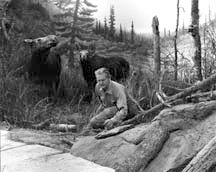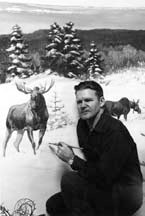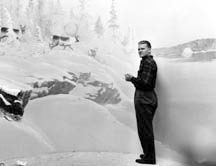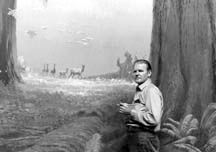
Dioramas, for those not familiar with their construction, are large hollow shells (like a hollow ball cut in quarters) on which are painted realistic landscape backgrounds. In front of these curved backgrounds are placed the mounted animals in their home terrain of bushes, trees, rocks, prairies, ice-floes, or other landscape materials: the whole effect causing the spectator to imagine that he or she is looking at animals in their natural setting. One test of the artist's skill is that the spectator should not be able to divine where the real foreground merges with the painted background. My own experiences, augmented by the years of exchanging ideas with the many master diorama artists who became my friends, gradually enabled me to meet and solve the many and often unforeseen challenges of doing these complicated museum dioramas. The creating of these dioramas, and the wilderness expeditions they made necessary, have been a great source of pleasure over the years.

Of the eighteen dioramas I have created over my lifetime, probably the most demanding (if one excepts Manitoba's big Boreal Forest Moose diorama) was the large Red River Buffalo Hunt diorama, which at the request of the directors of the Manitoba Museum of Man and nature, I completed in time for the Museum's opening on July 15, 1970 by her Majesty Queen Elizabeth II.
For this Buffalo Hunt diorama with which I was preoccupied for over five years from first conception to eventual completion, I made trips to most of the major buffalo ranges (where sometimes the buffalo wardens staged stampedes of several hundred buffalo so that I could experience standing in the path of a stampeding buffalo herd.) I made numerous sketches, took movies and photographs, collected sod, prairie grasses and shrubs, made casts of rocks from the untouched prairie buffalo range: and finally, aided by master taxidermist Walter Pelzer and hard-working artist Jim Carson and with the cooperation of the museum staff, the exhibit was completed as the major show piece for the museum's opening.

My involvement with dioramas, however, began much earlier. During the 1930's and 40's I had travelled to the United States visiting major natural history museums, studying such diorama collections as the great African and North American Halls in the American Museum of Natural History in New York and along the way becoming acquainted with some of the famed diorama artists: Francis Lee Jacques, Carl Rungius, James Perry Wilson, William Treher, Belmore Browne and a host of others.
So when at a convention of the Learned Societies in Winnipeg (about 1958 or '59) I was asked by Frank Banfield of the National Museum in Ottawa, if I would be interested in undertaking several dioramas - moose, Dall sheep, pronghorn antelope, and Barrenground caribou, I accepted without hesitation. I must confess, though, in retrospect, that I did have a few misgivings about how I, having lost my right arm, would manage the climbing up and down and painting from the platforms of the teetering twelve foot scaffolding required for doing the skies in these sixteen to twenty foot high diorama shells.









